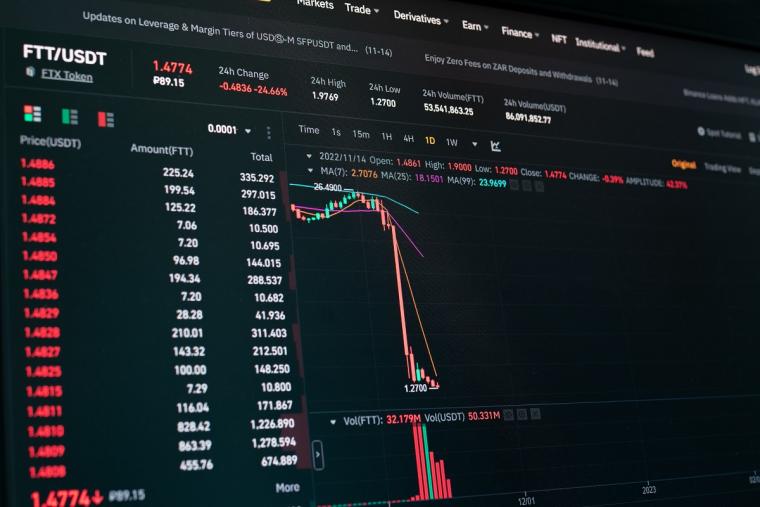
Remeber when bidet company TUSHY made headlines with its offer for stadium naming rights sponsorship and everyone pooh-poohed it because it was wasn't proven and, well, it was laughable? Yeah... think about who's laughing now.
Sports sponsorships have always endeavored (but not always successfully) to walk the fine line between easy money and a guaranteed payout. And at the moment, those who partnered with cryptocurrency platform FTX are out of some serious dollars. Oh, and those who had sports venues with title rights sponsorships need a message, so here it is: Get a crowbar. Start prying the name off the marquee.
TUSHY is starting to look pretty enticing right now. Even with their dubious social media challenges.
According to Investopedia, FTX filed for bankruptcy on November 11 following a surge of customer withdrawals earlier in the month. The organization’s 30-year-old CEO, Sam Bankman-Fried, admitted that the company did not have sufficient assets in reserve to meet customer demand.
What followed was a goat rodeo of everything that could go wrong. Investopedia’s article notes that “Within hours of filing for bankruptcy, FTX was hacked. The exchange noted “unauthorized transactions” that may have stolen close to $500 million in assets, and which were spotted by Elliptic. The hacker continued to drain wallets for several days using what analysts called “on-chain spoofing.” The hacker reportedly then invested those funds into Ether (ETH).”
Competing platform Binance briefly considered buying out FTX – something investors desperately wanted; however, it ultimately decided against it. Then, says SportTechie, on December 12, Bankman-Fried was arrested in the Bahamas, where he lives and also where FTX was based, after U.S. prosecutors filed criminal charges. According to the New York Times, the criminal charges against Bankman-Fried include wire fraud, wire fraud conspiracy, securities fraud, securities fraud conspiracy and money laundering. Matthew Goldstein of the Times reports that if the some of the charges involve FTT, the SEC could move to regulate crypto and call all tokens securities.
That has left multiple sports organizations, all of whom bought into that “fortune favors the brave” commercial with Matt Damon (which along with Larry David’s commercial for FTX, was promoted heavily during football programming) feeling a lot less brave, a lot more desperate, a lot less rich and more than a little foolish. (By the way, there's an update to Larry David's spot).
Here are just a few that jumped onto the bandwagon in its heyday:
- In March of 2021, FTX announced signed a 19-year, $135 million deal with the Miami Heat for the naming rights to their stadium, which, of course, became known as the FTX Arena.
- In June of that same year, Major League Baseball signed a deal with FTX to become the "Official Cryptocurrency Exchange brand of MLB." As part of the agreement, MLB had its umpires wear FTX patches on their uniform, and hailed FTX as its "first-ever umpire uniform patch partner."
- That August, FTX had its first sponsorship agreement with a college football venue, landing the naming rights to the field at California Memorial Stadium, the home court of the California Golden Bears, in a 10-year, $17.5 million deal. Under the terms of the new agreement, the venue was rechristened FTX Field at California Memorial Stadium.
- Also in August, FTX moved into the esports sector with a $210 million deal that included the sponsorship of Team Solo Mid (TSM) for naming rights, rebranding the team as TSM FTX.
- In September of 2021, notes the Sporting News, basketball star Steph Curry signed a partnership with FTX that gave him an equity stake in the company. The company, in turn, used the greatest shooter in NBA history as a global ambassador in their commercials and advertisements. Curry's team, the Golden State Warriors, were also big investors in the space. FTX signed a $10 million sponsorship with the franchise, featuring the brand all over their new arena, Chase Center, as well as the franchise's G League team, the Santa Cruz Warriors, and NBA 2K League team, Warriors Gaming.
- Additionally, multiple celebrities partnered with the platform, endorsing it and encouraging their fans to invest.
When news of the collapse of FTX broke, disappointment and panic broke out. Miami-Dade County and the Heat issued a joint statement on FTX, according to the Sporting News. Both organizations said they were “immediately taking action to terminate business relationships with FTX, and will be working together to find a new naming rights partner for the arena.”
 (In other words, we have a crowbar and we're not afraid to use it). MLB, too, terminated its FTX agreement. (Will they just rip the patches off the umpires’ uniforms? Talk about a bad call).
(In other words, we have a crowbar and we're not afraid to use it). MLB, too, terminated its FTX agreement. (Will they just rip the patches off the umpires’ uniforms? Talk about a bad call).
Hard on the heels of the news of FTX’s collapse, says the Tampa Bay Times, lawsuits were filed against Bucs quarterback Tom Brady and his ex-wife, Gisele Bundchen, as well as Jaguars quarterback Trevor Lawrence, NBA legend Shaquille O’Neal, the Warriors’ Curry, former Red Sox slugger David Ortiz, Angels phenom Shohei Ohtani, tennis star Naomi Osaka and even entire teams, including the Dallas Mavericks and the Golden State Warriors. The suit was filed in Miami’s Southern District of Florida by a group that includes prominent lawyers David Boies and Adam Moskowitz.
“FTX were geniuses at public relations and marketing,” Moskowitz said in a statement, “and knew that such a massive Ponzi scheme, larger than the Madoff scheme, could only be successful with the help and promotion of the most famous, respected, and beloved celebrities and influencers in the world.”
Since the announcement of the lawsuit, Brady (and plenty of others) have removed tweets where they promoted the platform.
But even if other crypto brands don’t go away as a result of what happened to FTX, it’s likely that sports organizations (and anyone else) will tread carefully before engaging in financial transactions. Accordingly, stock in cryptocurrency platforms has plunged in recent weeks, according to Forbes.
After all, this is not the first time a crypto platform has come crashing down. In early 2022, Iqoniq liquidated, leaving several teams out of the funds they had been promised. It also left thousands of fans with tokens now deemed as worthless. And Sports Pro Media noted that the collapse of Manchester City’s partnership with 3Key Technologies and FC Barcelona’s with Ownix has created more consumer uncertainty about this growing sector.
Sports Pro Media took the question a step further, examining what could happen next in the sports market. Its reporters noted that Larry Mann, a partner at the rEvolution agency, had pointed to several other categories that could benefit. He told Reuters: ”While crypto might be cooling off as an emerging category, there are always other growth areas to watch – sports betting, CBD, Fintech, are a few examples to keep an eye on. If teams weren’t cautious before regarding crypto… they will be now. As it relates to increasing sponsorship revenue, teams/leagues are always looking for new opportunities, but what’s happening with FTX is a wakeup call.”
Of course, if anyone is really getting desperate for sponsorship, we’ll always have TUSHY, the brand that in 2020, made a bid for the Buffalo Bills’ stadium, with an eye to renaming it the TUSHY Stadium and hosting a championship there, known as the Toilet Bowl. Maybe in light of the FTX collapse, that option could make a splash.

